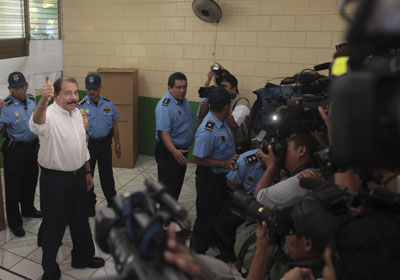It used to be that covering the Nicaraguan presidency was a coveted job for reporters. Now, it’s a frustrating exercise that borders on stenography.
During his past five years in office, President Daniel Ortega – who appeared well on his way to winning a second consecutive five-year term in Sunday’s presidential election, according to preliminary results – has given a grand total of zero news conferences. He did agree to sit down for two television interviews, one with David Frost in 2009 and the other with a Russian reporter in 2010. But he has shut out the local media.
Since Ortega took the oath of office in 2007, “he has answered about 15 questions from us, and I’m not exaggerating,” said Luis Galeano, a top editor at the Managua newspaper El Nuevo Diario.
Ortega is so secretive that reporters sometimes learn that he has left the country only when they see wire-service stories and photos of the Nicaraguan president greeting foreign leaders.
A former guerrilla fighter who presided over the revolutionary Sandinista government in the 1980s, Ortega has always been wary of the press. During his previous stint as president, from 1985 to 1990, when U.S.-backed Contra rebels were trying to overthrow his government, Ortega presided over press censorship as well as the temporary closing of opposition newspaper La Prensa.
This time around, the government’s media strategy is to ignore inquiring journalists.
Rosario Murillo, Ortega’s wife and his press secretary, has warned that the news media “contaminates” the government’s message, according to Lucydalia Baca, who covers Ortega for La Prensa. Thus, Ortega and other officials give speeches but almost never interact with reporters, including those who work for pro-government media outlets.
“There is an official monologue,” said Carlos Fernando Chamorro, a former Sandinista who now publishes the independent newsletter Confidencial and hosts “Esta Semana,” a TV news program critical of the government. “Reporters are considered enemies and when it comes to them there is an information embargo that is applied very rigorously. A lot of officials say they would love to talk to me, but they can’t.”
Give-and-take with government officials is so rare that journalists are sometimes caught off guard.
“At one event, Ortega spontaneously answered a reporter’s question,” Galeano said. “The rest of us were so shocked we were speechless. Nobody asked any more questions and the opportunity was lost.”
Even at lower levels of government, it’s extremely difficult to ferret out information. Government ministers and the heads of autonomous state agencies must clear interview requests with Murillo, who routinely denies access. Chamorro says that under Nicaragua’s public information law, government officials must provide timely and accurate information to the media, but that the statute is ignored.
Roaming the halls of the presidential palace in search of information can be an empty exercise because the president is almost never there. Ortega runs the government from his walled-off private home in Managua, which also serves as the Sandinista Party headquarters. According to Baca, several rooms of the palace have been converted into a greenhouse for the lush tropical plants that often decorate the stage when Ortega gives speeches.
So how does the press corps cope?
Baca says she often interviews former government officials to get a sense of what might be happening behind closed doors. “We will ask: ‘When you were the minister, what did you do?'” she said. In every story she writes, Baca makes clear that current government officials were unwilling to speak with her.
Still, reporters say the general public is being cheated.
“People feel there are issues that they need to know more about,” Galeano said. The government’s disdain for the media “affects our professionalism. Journalism has suffered a lot during this presidency because readers are not getting what they want. But it’s not our fault.”
Reporters briefly considered a news boycott of the presidency. But they rejected the idea, in part, because their audiences would get no information while Ortega would still get his carefully honed message across through speeches and public events aired by the country’s many pro-Sandinista TV and radio stations.
“We can’t renounce our right to cover the presidency,” Galeano said. “So we cover the president’s activities just in case there is a chance to speak with him.”
Baca once ran into Ortega, by accident, at a wake for the mother of a Sandinista party official. Afterwards, she tried to ask a few questions, but when Ortega learned for whom she worked, he clammed up. “He said that as long as I write for La Prensa, there is nothing for us to talk about,” Baca said.
